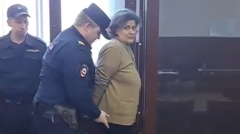In a startling case showcasing the stringent measures against free expression in Putin's Russia, hairdresser Anna Alexandrova has been sentenced to five years and two months in prison for allegedly disseminating anti-war messages on social media. Despite Alexandrova's assertions that the charges stem from a personal dispute with her neighbor, the Russian authorities have tightened their grip on any form of dissent since the onset of the Ukraine conflict in early 2022.
Russian Hairdresser Sentenced to Over Five Years for Anti-War Posts Amidst Crackdown on Dissent

Russian Hairdresser Sentenced to Over Five Years for Anti-War Posts Amidst Crackdown on Dissent
A St. Petersburg hairdresser has been jailed for over five years after being accused of spreading fake news, underscoring Russia's harsh crackdown on dissent following its invasion of Ukraine.
The case began when Alexandrova's neighbor reported her to the authorities, claiming that Alexandrova had sent photos related to the war to her daughter. The Kremlin's laws introduced shortly after the invasion deem "discrediting" the army a criminal offense. This has led to a significant increase in the arrests of critics and the silencing of independent media.
The court proceedings revealed that Alexandrova's original conflict with her neighbor had revolved around a local land dispute and environmental concerns. However, after police intervention, the situation escalated into serious charges when allegations of "fake news" surfaced. Alexandrova's lawyer suggested that her sentencing is emblematic of a broader pattern of repression where personal grievances can be weaponized against individuals for political ends.
This situation is not unique. Concurrently, four journalists received prison sentences of five and a half years for reportedly working with an organization labeled as extremist. They were accused of providing content to an anti-corruption group affiliated with the Kremlin's vocal opponent, Alexei Navalny, who died in prison. This climate of fear and denunciation recalls the Soviet era, when individuals reported their own acquaintances or family members to authorities.
As Alexandrova awaits transfer to a penal colony, her sentence adds to a troubling trend within Russia, where critics of the war and government face severe repercussions. The growing number of political prisoners and the increasing suppression of free speech reflect a nation deeply entrenched in authoritarianism, prompting ongoing debates about the future of dissent in Russia. The government continues to expand its legal framework to define dissent as a crime, effectively silencing opposition voices and reshaping public discourse under the guise of national security.
The court proceedings revealed that Alexandrova's original conflict with her neighbor had revolved around a local land dispute and environmental concerns. However, after police intervention, the situation escalated into serious charges when allegations of "fake news" surfaced. Alexandrova's lawyer suggested that her sentencing is emblematic of a broader pattern of repression where personal grievances can be weaponized against individuals for political ends.
This situation is not unique. Concurrently, four journalists received prison sentences of five and a half years for reportedly working with an organization labeled as extremist. They were accused of providing content to an anti-corruption group affiliated with the Kremlin's vocal opponent, Alexei Navalny, who died in prison. This climate of fear and denunciation recalls the Soviet era, when individuals reported their own acquaintances or family members to authorities.
As Alexandrova awaits transfer to a penal colony, her sentence adds to a troubling trend within Russia, where critics of the war and government face severe repercussions. The growing number of political prisoners and the increasing suppression of free speech reflect a nation deeply entrenched in authoritarianism, prompting ongoing debates about the future of dissent in Russia. The government continues to expand its legal framework to define dissent as a crime, effectively silencing opposition voices and reshaping public discourse under the guise of national security.






















